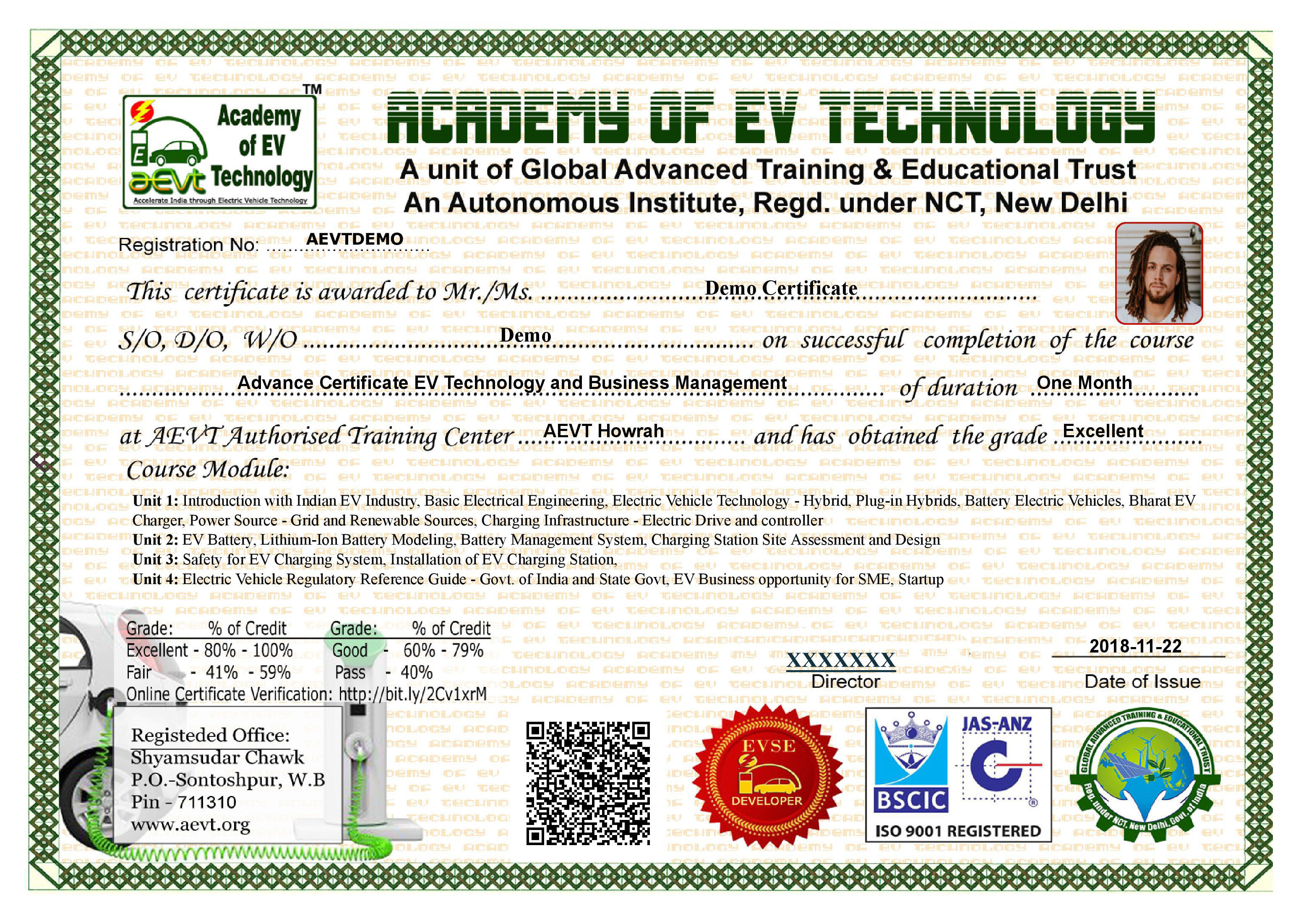Electric Vehicle Course Categories
- Master Degree
- PG Course
- Startups/Business Course
- Job Course
- Research and Development
Masters Degrees (Electric Vehicles)
| Program Title | University | Duration |
|---|---|---|
| Master in Electric Vehicle Engineering | Sweden’s leading university | one-year programme |
| MSc Mobility Engineering | Politecnico | 2 years |
| MSc Automotive Engineering for Electric Vehicles | University of Bedfordshire | 1 yera |
| PG Program in Electric Vehicle Powertrain | Joint program with UPES and Academy of EV Technology | 10 Months |
| Certificate in EV Technology | Joint program with UPES and Academy of EV Technology | 3 Months |
Startups/Business Course
| Program Title | Offered by | Duration |
|---|---|---|
| EV EVSE Business Management Course for Entrepreneurs | Academy of EV Technology | one Month |
| Lithium-ion Battery Pack Assembly Line | Academy of EV Technology | One Month |
| Electric Vehicle Charging Station Design, Installation | Academy of EV Technology | 1 Month |
| Program Title | Offered by | Duration |
|---|---|---|
| PG Program in Electric Vehicle Powertrain | Joint program with UPES and Academy of EV Technology | 10 Months |
| Certificate in EV Technology | Joint program with UPES and Academy of EV Technology | 3 Months |
Certificate in EV Technology
An individual should understand that Electric Vehicle Industry is a multi-disciplinary field and requires experts from different streams of engineering. Chemical Engineers will be suited to work on battery chemistry whereas electrical engineers will be good at selecting the best motor for the vehicle. Professionals with cross-sectional expertise in chemical engineering, electronics, embedded software and electrical engineering are set to be highly sought after.
A quick glance at job postings from various electric vehicle companies shows that they are looking for engineers proficient in a variety of domains for job profiles in EV Safety, Software, Motor Calibration in vehicles, Power Electronics, Mechanical Design etc. Engineers who have already been a part of the industry have a useful and mature skillset. These practical skills are valuable as they may not be available in textbooks and can only be learnt through experience. Example of such skills would be an overall understanding of the automotive industry, standard operating procedures of the domain, supply chain and consumer behavior.
There are several new-age startups and OEMs that are setting up manufacturing units to fuel clean mobility. Ather Energy plans to establish a unit in south India with an investment to the tune of USD 50 – USD 100 million dollars, and Mahindra Electric invested Rs 100 crore last year for a manufacturing plant in Bengaluru. Skilling is the Need of the Hour, Similar to that of the telecom industry, the transition from ICE vehicles has its share of challenges but there exist several opportunities in this shift.
This Electric Vehicle Technology Program, in collaboration with University of Petroleum and Energy Studies, gives training on the skills required to become a successful Electric Vehicle Engineer. Throughout this exclusive course, you'll become master of Electric Vehicle Architecture, electric vehicle Energy storage designing and electric vehicle powertrain and EVSE required to excel in this domain and kick-start your career in Electric Vehicle
TRAINING METHODOLOGY:
Live Interactive Classes::
AEVT Live Interactive Class, where students and teachers meet together at schedule class time with whiteboard, voice and live video, Lectures and Question answer occur at the same hour.
Our expert faculty members take session on each paper that is delivered through live sessions. These sessions are joined by students from India and Abroad. Trainers will discuss in each class session about Key concepts, whiteboard calculation, design, costing, documentation, case studies and real life examples. Students also get chance to clarify their doubts / academic clarifications. If by any chance you miss these live classes, don't worry, each class recorded sessions are uploaded in the AEVT E-Library/LMS.
Hands-on Practical
We know that only theoretical knowledge by online or virtual classes are not sufficient to get full expertise. An individual needs a practical exposure to flourish in a Job or business market.
So we offer practical session at AEVT Lab/Workshop after completion of live interactive online classroom session .In this approach a trainees can fulfill his/her knowledge in a very effective way and time.
We offer project-based blended learning experiences that promote academic and career success for Technical Education.
Teaching and Learning Material
AEVT have dedicated online library (AEVT E-Library) facility for students and stored all Learning Material (E-book, class recording, business releated documents) at AEVT E-Library.
AEVT E Library System provides access to more than 100 + e-books covering all fields of knowledge, e.g. EV Battery - BMS, Charging Station Design, Installation, Government rules and Business opportunity etc and also we have a huge collection of national and international journals, case studies, research papers.Student can access this E-library for self study.
Eligibility
Must be Engineering Graduate
Medium:
English
Certificate will be Awarded by
Academy of EV Technology, A Unit of Global Advanced Training & Educational Trust, Regd. under NCT New Delhi, Govt. of India
Course Syllabus:
We know that only theoretical knowledge by online or virtual classes are not sufficient to get full expertise. An individual need a practical exposure to flourish in a Job or business market. So we are going to arrange practical or workshop session after completion of live interactive online classroom session .In this approach a trainees can fulfill his/her knowledge in a very effective way and time.
EVA-1
- Market Growth and Opportunity
- Types of Electric Vehicles - EV Architecture
- Battery Electric Vehicles
- The IC Engine/Electric Hybrid Vehicle, Fueled EVs
- Fueled EVs
- Solar-Powered Vehicles
- Vehicles using Linear Motors
- Fuel cell Vehicle
- EVs for the Future
4+ E-Book for self study
EVA-2
- General Description of Vehicle Movement, Vehicle Resistance, Dynamic Equation
- Concept of Hybrid Electric Drive Trains
- Architectures of Hybrid Electric Drive Trains
- Series Hybrid, Parallel Hybrid Electric Drive Trains
- Power Train Tractive Effort and Vehicle Speed
- Power Transmission Characteristics
- Vehicle Performance
- Braking Performance
4+ E-Book for self study
EVA-3
- Energy Consumption in Braking
- Fundamentals of Regenerative Braking
- Braking Power and Energy on Front and Rear Wheels
- Brake System of EVs and HEVs
- Series Brake - Optimal Feel
- Series Brake - Optimal Energy Recovery
- Parallel Brake
- Antilock Brake System (ABS)
2+ E-Book for self study
PEV-1
- Electric Propulsion Systems - DC Motor Drives
- Principle of Operation and Performance
- Basic Operation
- Principles of Induction Motors
- Basic Principles of BLDC Motor Drives
- Control of BLDC Motor Drives
2+ E-Book for self study
PEV-2
- Induction Motor Switched Reluctance Motor Drives
- Reluctance Motor Drives
- SRM
- Electric Motors as Brakes
- Motor Cooling
- Motor Efficiency
- Motor Size and Mass
2+ E-Book for self study
EVBT-1
- A brief classification of li Ion cell technology and its electro-chemistry. Advantage and disadvantages of over different cell technologies
2+ E-Book for self study
EVBT-2
- Electrochemical Batteries
- Battery Technologies
- Lead-Acid Batteries
- Nickel-based Batteries
- Nickel/Iron System
- Nickel/Cadmium System
- Nickel–Metal Hydride (Ni–MH)
- Lithium-Based Batteries
- Lithium–Polymer (Li–P) Battery
- Lithium-Ion (Li-Ion) Battery
2+ E-Book for self study
EVBT-3
- Battery cell parameters like cell voltage
- Cell AH
- Specific energy
- life Cycle
- Charging and discharging
- C-rating
- Self discharge
- other parameters like SOC, DOD
2+ E-Book for self study
EVBT-4
- Battery Pack sizing consideration - Time and charge/discharge cycles
- Beginning of life (BOL)
- End of life (EOL), Time
- Battery life testing
2+ E-Book for self study
EVBT-5
- Battery Charging, Protection, and Management System
- why a BMS need for a battery pack
- BMS building blocks
- BMS characteristics
- BMS operation
- BMS classification
2+ E-Book for self study
EVBT-6
- Active Thermal Management Systems
- Passive Thermal Management Systems
- Temperature—Protection and Insulation
- Thermocouples and Measurement
- Battery Heat Transfer
2+ E-Book for self study
EVBT-7
- Repairing and Remanufacturing
- Refurbishing
- Repurposing, and Second Life
- Second Life Partnerships
- Recycling
2+ E-Book for self study
EVBT-8
- Material need to assemble battery pack
- Wires, connector selection
- heat shrink, cell holder
- accessories related to battery pack construction
2+ E-Book for self study
EVBT-9
- size battery pack with considering all aspect of condition
- Range Calculation
- Battery Capacity
- Battery String Calculation
2+ E-Book for self study
EVSE-1
- Introduction with modern power electronics
- types of power converter, characteristics of power diodes etc.
2+ E-Book for self study
EVSE-2
- Introduction with power Transistor
- Power MOSFET
- IGBT,SCR,GTO, SIT,MCT
- New Semiconductor material invention and new trends of developments
2+ E-Book for self study
EVSE-3
- Power conversion common and basic principle
- Basic topologies of different converters
- Buck converter
- Boost converter
- Buck-Boost Converter
- Three Phase Inverter
2+ E-Book for self study
EVSE-4
- Introduction with OBC and EVSE
- Architecture of OBC
- Electric Vehicle Supply Equipment
- Different types of charging conductive and inductive charging
- High Voltage Battery Charging Methods & Battery Pack
2+ E-Book for self study
EVSE-5
- Electric Vehicle Charging Station Technology
- Different levels of chargers
- Different modes of charger
- Charging cables
- Switchgear system
2+ E-Book for self study
Project based Practical
Training Fees: Rs. 4,999/-
Registration Fee Rs. 20,000/-
DD University Registration Fee: INR 20000/
DD in favor of "University of
Petroleum and Energy Studies" payable at Dehradun.
Send DD to Global Advanced Training and Educational Trust,
Shyamsundar Chawk, P.O - Sontoshpur, Dist – Howrah, W.B – 711310
Pay Now Training Fees only.
Submit Registeration for this course:
Submit Registration
Eligibility
Must be Engineering Graduate
Admission Process
- Submit Registration
- AEVT Admission cell will check form data and they will inform you to pay Course fees
- Deposit Course fees
- Admission cell will send your E-registration certificate and E-library access
- Training cell will send you class schedule
- Trainiers Team will send your class link
- Training cell inform you about practical session at the end of Online live class session
- Exam cell will conduct online examination and send E-Certificate, E-marksheet
- EDP Desk will provide business guide/support for you (https://edpdesk.gatetrust.org )
Become an EV Expert with Verified Skill Certification

1. An Autonomous Institute registered under NCT, Govt. of India under Indian Trust Act.
2. Registered Under NGO-DARPAN, NITI Aayog Govt. of India
3. ISO 9001:2015 registered Educational Trust
4. Registered under 80G and 12A and CSR Act, Govt. of India
5. Practical and Research Lab at GATE Trust Howrah, West Bengal
6. GATE Research - Research unit of Global Advanced Training and Educational Trust. You can Write & Publish a Review/Research paper,
Quick Inquiry Form

Interactive Session

Practical & Doubt Session

E-Library Study Materials

Online Evaluation










